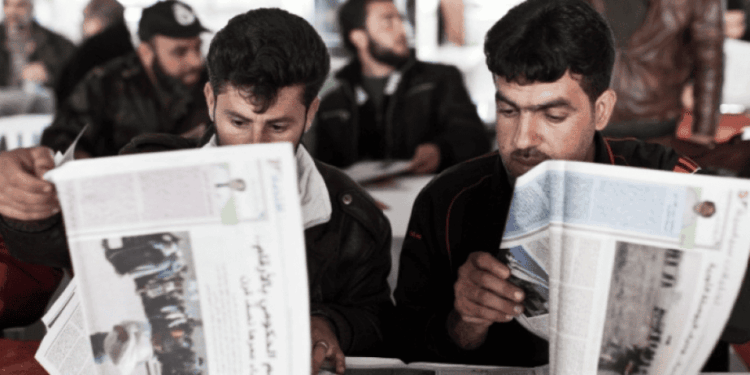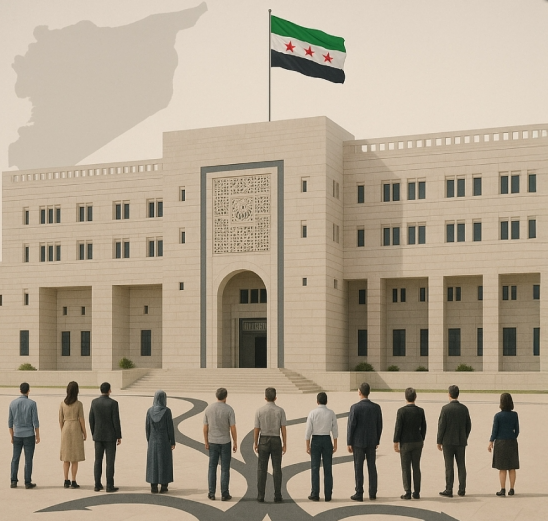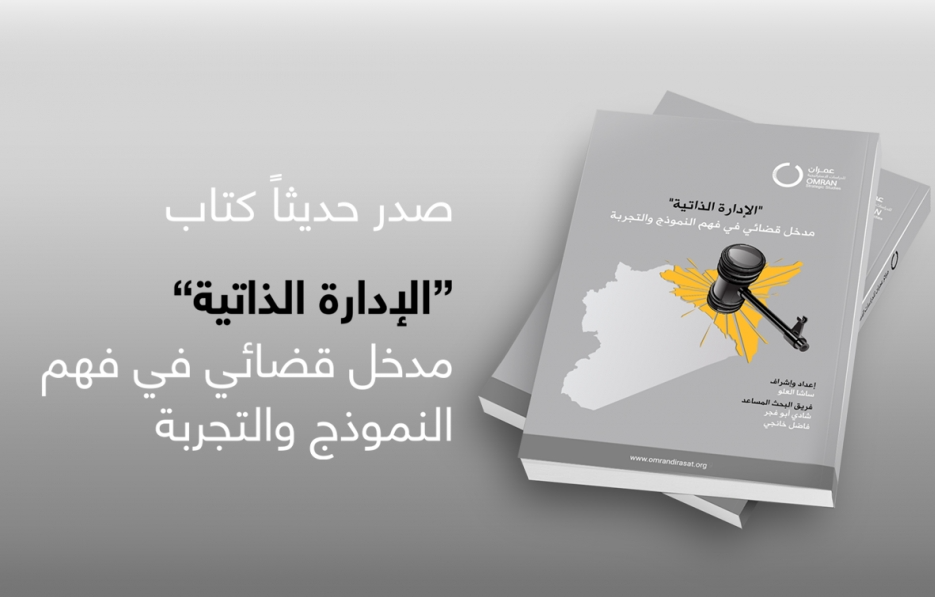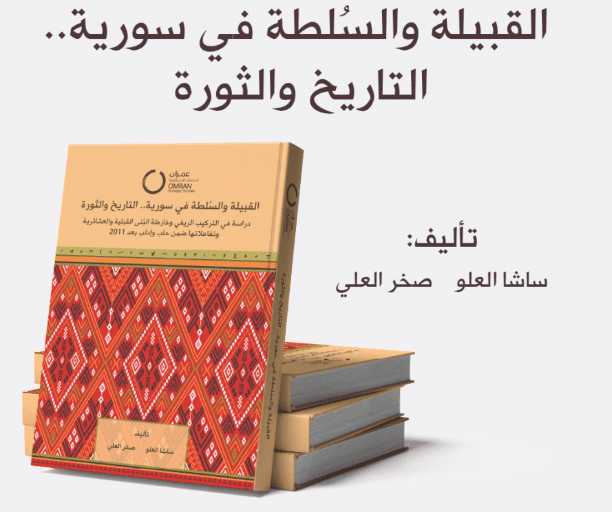The deposed Assad regime prevented the publication of 140 pieces of legislation between 2010 and 2023, including 110 legislative decrees and 30 laws, according to a previous study by the Omran Center titled “Access to Legislation… Another Right Denied by the Assad Regime.” The Assad regime relied on Article 3 of Publication Law No. 5 of 2004 to prevent the publication of these pieces of legislation “based on the necessity of national defense and the requirements of state security.”
The broad interpretation and use of this article allowed the Assad regime to evade the publication of some pieces of legislation, relying on the provisions of this article, which allow it to do so under legal cover. This is compounded by clear shortcomings in the 2012 Constitution in general, and the right to access information in particular. The Assad regime has also violated international laws and failed to implement the treaties it has signed, such as the International Covenant on Civil and Political Rights. It also violates the provisions of Paragraph 2 of Article 3 of the Media Law issued by Legislative Decree No. 108 of 2011, which stipulates “the citizen’s right to access information related to public affairs.”
Previously, legislation in Syria was divided into two categories: “laws,” which are legislative texts approved by the People’s Assembly and then promulgated by the “President of the Republic,” and “legislative decrees,” which are texts issued directly by the “President of the Republic” and subsequently submitted to the People’s Assembly for ratification as a routine procedure. Legislative decrees were often issued outside of regular sessions of the People’s Assembly, or when sessions were adjourned at the end of official holidays during the Assembly’s sessions.
Today, after the fall of the Assad regime, the transition of a caretaker government to manage the country’s government institutions, and the constitutional declaration, the importance of access to information has resurfaced. This is particularly true given the lack of clarity surrounding the validity of the decisions and circulars issued in general, and the confusion and disarray among Syrians. This also opens the door to rumors and the falsification of news or decisions, thus leading to the loss of accurate information.
“It shall be communicated to those who are required to implement it”… in exchange for exposing regime loyalists.
Among the practices that have been entrenched over the past period, and which continue to persist, is the formula at the end of a large number of ministerial decisions and circulars, where the text is concluded with the phrase “It shall be communicated to those who are required to implement it,” a phrase that implicitly implies that the decision will not be published publicly. In this case, publishing the decision on official platforms constitutes a violation of the decision itself. To rectify this situation and overcome this problem, it is preferable to reformulate the wording to “It shall be published and communicated to those who are required to implement it,” which ensures publicity without conflicting with implementation.
If the primary goal is to withhold their publication, this indicates a lack of awareness of the importance of transparency among the entities issuing them. In other cases, decisions are not officially published but leaked via social media, revealing gaps in the confidentiality mechanisms within government institutions. When these documents are circulated unofficially, this reflects either administrative laxity or deliberate leakage, which calls for stricter oversight measures to identify those responsible for the leaks and punish them in accordance with applicable laws and regulations.
Apart from the issue of publishing or withholding decisions, it cannot be denied that the publication of these decisions, whether through official accounts or through leaks, has significantly contributed to the revolutionary community exposing a number of cases in which regime loyalists were appointed to sensitive positions. This has prompted the responsible authorities to reconsider some appointments, as occurred with a number of decisions by the Ministry of Justice, the Ministry of Higher Education, the Ministry of Transport, and other ministries and institutions.
What is lacking in the current appointment process for administrative positions is a vetting process for these candidates. Due to the current situation after the fall of the regime, this process may become more complicated due to the absence of established state institutions and the potential for unqualified individuals or those involved in illegal practices to infiltrate positions of power. To ensure the selection of competent and honest individuals, a comprehensive vetting methodology must be adopted that takes into account the new political and social context.
This methodology should take into account several factors, most notably: verifying the political and professional background of candidates, by examining their affiliation with the former regime and whether they were involved in corruption or repression; reviewing their qualifications, experience, and competence; conducting criminal, judicial, and financial due diligence; examining their financial assets to ensure they are not part of the corrupt networks associated with the former regime; and examining their public reputation and social behavior, by searching the media and social media for any statements or positions hostile to the revolution and/or supportive of the Assad regime.
This approach also requires increased efforts from society (which so far appear to be effective) in a more sustained manner, in order to benefit from the vast amount of documented information it has on figures loyal to the regime or who are administratively or financially corrupt. This effort should not remain limited to state institutions, which appear to be under intense pressure due to the large number of files open to them.
The Official Gazette with a New Concept
The official publication of all documents, including legislation, decisions, circulars, and other texts, is governed by Publication Law No. 5 of 2004. The law details the definition of the Official Gazette, the publication mechanism, the documents subject to publication, the numbering method for each document and the page numbering of its sections, and the entity supervising the publication process.
The Official Gazette itself is not officially accessible online via a state-approved website or portal, which was the practice under the Assad regime. Furthermore, the files are not searchable due to the way they are presented. This has made it extremely difficult for researchers, activists, and the general public to access information, which is their inherent right. This has forced a number of them to purchase the Official Gazette as PDF files and then perform Optical Character Recognition (OCR) operations. This is a technology used to extract text from images or scanned documents (such as scanned PDF files or photos). This is a relatively costly process.
In contrast, the Salvation Government has a promising and nascent experience in issuing its own official gazette. It issued its first issue on May 13, 2023, and continued until issue 80, published on December 5, 2024, three days before the fall of the regime. This gazette features the ability to independently search within each issue, a feature not available in the previous regime’s Official Gazette. However, it is an excuse for not being able to comprehensively search all issues at once in the Salvation Government’s Official Gazette.
The state’s Official Gazette has been suspended since the fall of the regime and has not yet been reactivated during the transitional period. The last available issue was issue 47, published on November 27, 2024. The gazette should be reactivated as soon as possible, especially since the Constitutional Declaration stipulates in its final article that the announcement must be published in the Official Gazette. Efforts should also be made to make the Official Gazette freely available and improve the electronic publishing process to ensure citizens and researchers have easy and transparent access to official information.
As an emergency solution, and to prevent rumors and any possible forgery, an electronic barcode can be placed on all issued decisions. When scanned electronically, this code will lead to an exact copy of the decision stored in a special tab on the website of the relevant ministry or institution. A copy of these decisions should also be sent to the Directorate of Publications and Printing so that it can be included in the Official Gazette when their issuance is monitored. A website should also be provided for this purpose, through which all decisions and, subsequently, issued legislation can be verified.
Access to Information: Necessary Steps for a Future Syria
Access to information is a fundamental principle of good governance, as it enhances transparency, combats corruption, and supports community participation. However, this right sometimes conflicts with confidentiality requirements, especially in matters of national security, personal data, and strategic interests. This requires striking a balance that ensures the availability of information without harming the public interest.
Transparency is the basis for citizens’ trust in institutions, as it enables them and civil society to monitor the performance of authorities and expose violations, which contributes to improving policies and reducing corruption. Access to information is also essential to enhancing accountability and empowering citizens to understand how public resources are managed and make decisions that affect their lives. In countries with transparent laws, corruption is lower, and institutional efficiency is higher thanks to public oversight.
Despite the importance of transparency, confidentiality remains necessary in some cases, such as intelligence and military information, the disclosure of which could jeopardize national security. Diplomatic negotiations and some strategic research also require a certain level of confidentiality to protect state interests.
In the short and long term, it is essential to address constitutional shortcomings regarding access to information by enshrining this right in the new constitution and issuing a modern publication law to replace Law No. 5 of 2004. To achieve a balance between confidentiality and transparency, a clear legal framework must be established that defines when information must be made available and when it may be withheld, with carefully defined exceptions, rather than the arbitrary decisions of the former regime.
A government body should also be established to oversee the implementation of the Access to Information Law, should it be enacted. A unified electronic platform should also be developed under the authority to facilitate access to non-sensitive data. Institutions should also be required to publish their decisions and circulars, as well as periodic reports on their performance. The mere existence of official social media accounts, such as Telegram, X, or Facebook, is not sufficient, despite their importance.












